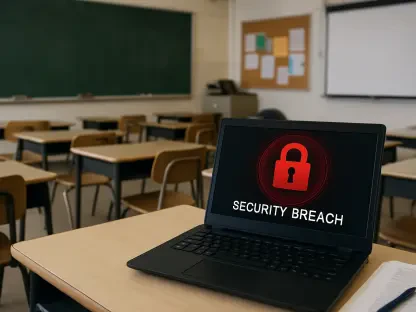Camille Faivre is a distinguished expert in education management, particularly in the development and implementation of open and e-learning programs. Her insights are especially valuable in understanding the current dynamics between higher education institutions and federal policies, particularly in the challenging post-pandemic era.
Can you explain the situation with Harvard and the U.S. Department of Homeland Security?
The U.S. Department of Homeland Security recently threatened to revoke Harvard University’s ability to enroll foreign students. This ultimatum came with a demand for the university to comply with an extensive record request by April 30. Alongside, they canceled $2.7 million in grants to the university.
What was the reason behind Homeland Security’s threat to pull Harvard’s ability to enroll foreign students?
Homeland Security’s threat is tied to the university’s alleged failure to provide detailed records on foreign student visa holders’ illegal and violent activities. Additionally, other federal agencies have concerns linked to academic programming and institutional governance.
What are the specific demands from Homeland Security that Harvard has to comply with by April 30?
Homeland Security is demanding that Harvard submit detailed records on the illegal and violent activities of its foreign student visa holders. They also require Harvard to verify its compliance with certain reporting requirements related to these students.
Why did President Trump call for Harvard to lose its tax-exempt status and all federal funding?
President Trump has been critical of Harvard, suggesting it should lose its tax-exempt status and federal funding. This comes in response to Harvard’s refusal to comply with certain federal demands, which he has framed as the university failing to protect Jewish students and allegedly fostering antisemitism.
Can you provide details on the actions taken by the Trump administration’s antisemitism task force against Harvard?
The administration’s antisemitism task force froze over $2.2 billion in multi-year grants and contracts to Harvard. They also delivered a list of ultimatums including changes to academic programming and governance reforms. These actions seem framed as measures to combat alleged antisemitism at the university.
What was Harvard’s response to the administration’s demands related to antisemitism concerns?
Harvard, through its President, Alan Garber, rebuked these demands, asserting that they overstep federal authority and infringe on the university’s constitutional rights. Garber emphasized that no government should dictate private universities’ academic and administrative decisions.
Why did Harvard refuse to comply with the demands from the Trump administration?
Harvard’s refusal stems from its stance that these demands constitute an overreach by the federal government, impinging on their autonomy and constitutional rights to self-governance and free inquiry.
What are the potential implications for Harvard if it does not comply with the federal demands?
If Harvard does not comply, it risks losing its ability to enroll international students, which would significantly impact its diverse student body, as well as billions in federal funding and potentially its tax-exempt status.
What was the reaction of higher education and free speech experts to the federal demands on Harvard?
Experts in higher education and free speech agree with Harvard’s assessment that the federal demands are an overreach of authority. They see these actions as infringing on academic freedom and autonomy.
How did Harvard respond to the Homeland Security Secretary Kristi Noem’s statement about the university’s leadership?
In response to Kristi Noem’s statement accusing Harvard of “bending the knee to antisemitism” and having “spineless leadership,” Harvard reiterated its stance on maintaining autonomy and defending its institutional freedoms against what it perceives as heavy-handed federal interference.
What records is Homeland Security demanding from Harvard regarding foreign student visa holders?
Homeland Security has demanded detailed records on the alleged illegal and violent activities of foreign student visa holders. This is part of a wider effort to enforce compliance with federal regulations regarding international students.
What is the impact on foreign students attending a non-SEVP approved college?
Foreign students attending a non-SEVP approved college cannot legally maintain their student visa status. Losing SEVP approval would force international students to transfer or face deportation.
How has the Student and Exchange Visitor Program affected foreign students in recent weeks?
The program has recently been under scrutiny as several foreign students have had their visas revoked without prior warning, leading to legal actions against the Department of Homeland Security.
Can you provide data on the number and percentage of international students enrolled at Harvard for 2024-25?
For the 2024-25 academic year, Harvard enrolled 6,793 international students, who constitute 27.2% of the university’s total enrollment.
What happens if Harvard cannot verify its compliance with reporting requirements related to foreign students?
If Harvard fails to verify compliance with the mandated reporting requirements, it will lose the privilege to enroll foreign students, severely affecting its international population and diversity.
How did President Trump publicly criticize Harvard following its condemnation of federal interference?
President Trump criticized Harvard through social media, calling it a “JOKE” and a place of “Hate and Stupidity.” He also suggested that Harvard should not be considered one of the world’s great universities and should lose its federal funding.
What actions has the Internal Revenue Service reportedly taken regarding Harvard’s tax-exempt status?
The IRS is reportedly making arrangements to revoke Harvard’s tax-exempt status, which could have significant financial implications for the university.
How did Columbia University respond to a similar round of demands from the Trump administration’s task force?
Columbia University complied with similar demands from the task force and had $400 million in federal contracts and grants canceled. Despite compliance, the task force has not publicly reinstated Columbia’s funding.
Have there been any signs of reinstating federal funding for Columbia University after its compliance?
As of now, there have been no public moves to reinstate federal funding for Columbia University, suggesting that compliance does not guarantee financial relief.
What is Columbia University’s current stance on government interference in light of Harvard’s defiance?
Columbia has now taken a stand against what it sees as heavy-handed governmental orchestration, aligning with Harvard in defending the autonomy and best interests of their institutions.
Do you have any advice for our readers?
In these challenging times, it’s crucial for institutions and individuals alike to stand firm in their principles and beliefs. Navigating the complex relationship between higher education and government demands careful consideration and a steadfast commitment to preserving academic freedom and institutional autonomy.









